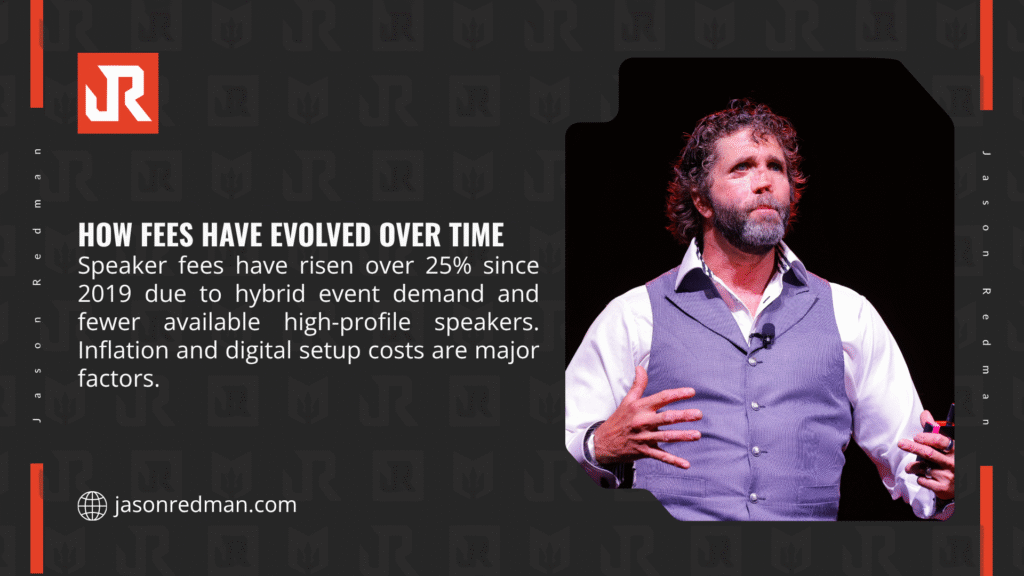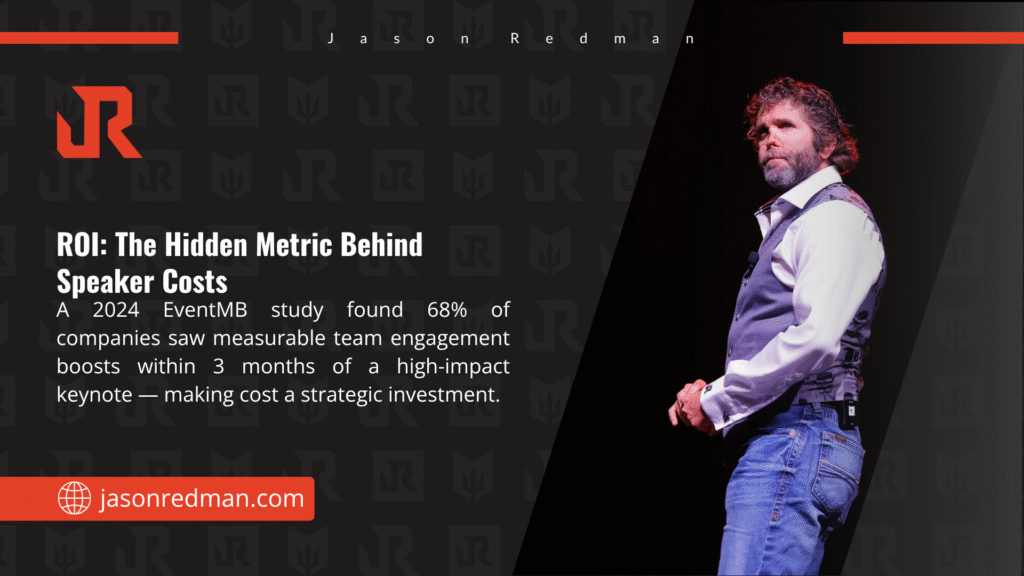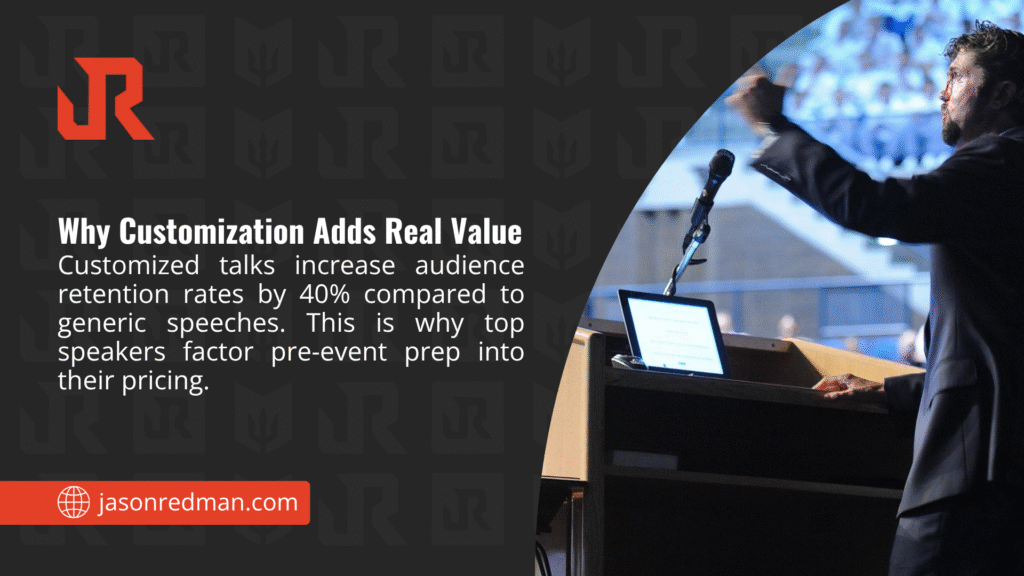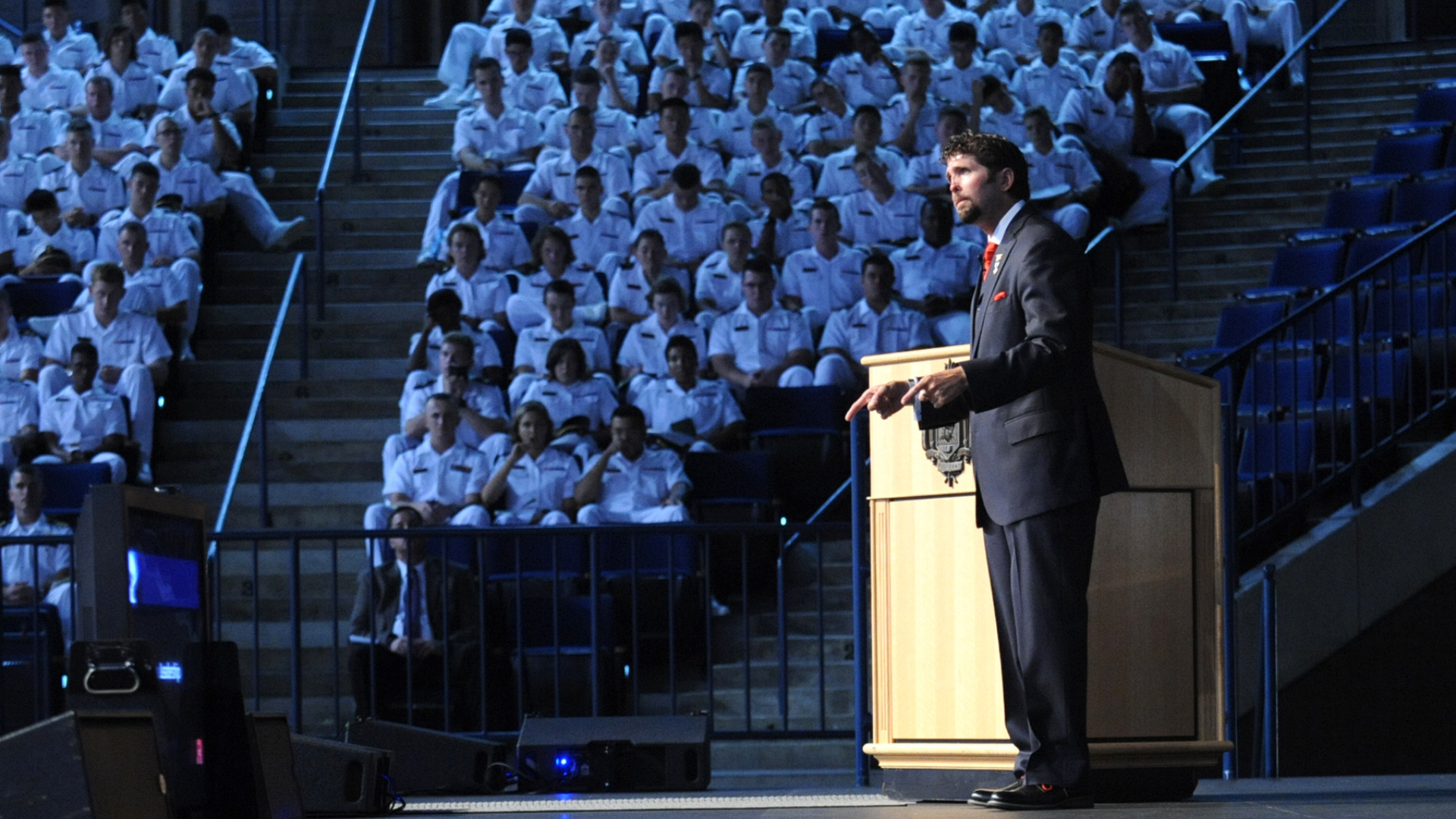Summary
| What You’ll Learn | Why It Matters |
| Real 2025 market rates for keynote speakers | You’ll finally see what speakers actually charge |
| What drives the price up (or down) | Reputation, customization, and event scale define value |
| Hidden costs no one talks about | Travel, bureaus, and “prep fees” can quietly double your total |
| How to plan and negotiate like a pro | Saves budget and prevents bad bookings |
| Where Jason Redman fits in the market | Real experience that justifies top-tier rates |
The Straight Truth About Speaker Prices
You’ve probably searched “how much does a keynote speaker cost” and found ten different answers that all contradict each other. One blog says $5,000, another says $50,000, and a few want you to “book a discovery call.”
Here’s what’s real: In 2025, the range is wide because not all speakers are built the same. Some are ex-CEOs with scars from real boardroom wars; others just discovered Canva last week and call themselves “thought leaders.”
So let’s break down what the actual market looks like, with real numbers, not vague guesses.
| Speaker Level | Typical Cost (USD) | What You’re Paying For |
| Entry-Level / Local Expert | $1,500 – $5,000 | New talent testing the circuit. Good energy, limited experience. |
| Corporate / Mid-Tier | $5,000 – $15,000 | Skilled professionals with case studies and proven delivery. |
| Top Professional | $15,000 – $30,000 | Strong media presence, book authors, and industry recognition. |
| Celebrity / Iconic | $30,000 – $200,000+ | Public figures, athletes, or influencers who guarantee ticket sales. |
That’s the raw cost reality. But the question “how much does a keynote speaker cost” isn’t only about dollars, it’s about return. Because a $25,000 talk that changes company culture beats a $5,000 talk that makes people scroll their phones.
What You’re Actually Paying For (and What You’re Not)
A keynote speaker isn’t there just to “say a few words.” They’re the emotional engine of your event. They set the tone, command the crowd, and decide whether attendees leave fired up or mentally halfway home.
The best ones do three things that justify their price:
- They personalize everything. Not fake customization with your logo on a PowerPoint slide, real customization built on research and pre-event calls.
- They connect emotionally and practically. Motivation without takeaways fades fast; practical frameworks stick.
- They carry authority. You feel it in the room. Presence like that doesn’t come cheap.
| Cost Driver | Impact on Price | Why It Matters |
| Experience | Major | Seasoned speakers charge more because they consistently deliver results. |
| Topic Complexity | Medium | Leadership, crisis, or resilience topics require more prep and credibility. |
| Custom Work | High | Pre-event interviews, custom stories, and slides can add 10–20%. |
| Event Size | Medium | A crowd of 50 vs 5,000 changes energy, pressure, and fee expectations. |
| Travel Time | Medium | Out-of-state or international events add costs for flights and downtime. |
| Exclusivity | High | Asking a speaker not to appear at other events near yours costs extra. |
| Virtual Events | Lower | Virtual speaker fees often run 50–70% cheaper than live appearances. |
If you’re grooming internal speakers or execs to take the stage, bookmark fear of public speaking; it’s a game-changer before big presentations.

The Hidden Costs Everyone Forgets
Most planners focus only on the headline fee. Big mistake. Behind every “$20,000” quote, there’s a silent entourage of costs waiting to pounce later.
| Expense | Typical Range | Why It Matters |
| Travel & Lodging | $1,000 – $3,000+ | Airfare, hotel, meals, and transportation, not always included. |
| AV & Recording | $500 – $5,000 | Want to record or stream? Expect a separate rights clause. |
| Research & Prep | $500 – $2,000 | Custom content and pre-event discovery calls take hours. |
| Bureau or Agent Fees | 25–30% | Hidden inside your quote, that’s how speakers bureau fees work. |
| Rush or Weekend Fees | Variable | Short notice, holiday, or off-day bookings can raise costs fast. |
Ask every speaker for a complete breakdown before signing anything. If the proposal only says “Keynote – $20,000,” ask what that includes: travel, customization, or just the talk.
Transparency avoids those awkward “Oh, that’s not covered” moments two weeks before your event.
Virtual vs. In-Person: The 2025 Fee Divide
Post-pandemic, virtual events aren’t a backup plan anymore; they’re part of the strategy.
And they’ve completely changed how much a keynote speaker costs.
| Format | Typical Cost | What You Get |
| In-Person Keynote | $10,000 – $50,000 | Full-room energy, body language, audience connection. |
| Virtual (Live) | $5,000 – $20,000 | Shorter time, easy logistics, but still engaging. |
| Virtual (Pre-Recorded) | $2,000 – $10,000 | Clean delivery for hybrid or international audiences. |
Virtual fees stay lower because there’s no travel, fewer time blocks, and minimal setup.
If you’re organizing a multi-location event or a hybrid summit, this can save 40–60% without killing quality.
Need help narrowing the right format? Read how to find a keynote speaker; it breaks down how to pick based on your audience and goals.
How to Build a Realistic Speaker Budget
Let’s get practical. You’ve got a number in mind. Now, how do you spend it wisely? Here’s a simple roadmap that keeps you from overpaying or getting scammed by charisma.
| Step | What to Do | Why It Saves You |
| 1 | Define the goal first | “Inspire” isn’t enough; know the result you want. |
| 2 | Pick the right topic lane | Motivation, leadership, resilience, or technical insight? Choose before browsing. |
| 3 | Lock your budget | Decide before calls so agents don’t push you past it. |
| 4 | Request full breakdowns | Travel, AV, extras, never assume. |
| 5 | Get everything in writing | Avoid handshake deals; speakers book months out. |
Start scouting speakers 4–6 months in advance. Top names are often booked solid, and last-minute hunting either kills your budget or forces you to settle.
If you’re brand new to the process, the full guide on how to book a speaker walks you through contracts, timelines, and negotiation scripts that actually work.
When Bureaus Get Involved
Speakers bureaus act like agents, matchmakers who pair you with talent. They’re free to you (technically), but they take their cut from the speaker’s side.
The advantage: bureaus filter the field, vet speakers, and handle paperwork and logistics. The risk: some push specific speakers who make them bigger commissions.
When you talk to a bureau:
- Be upfront with your budget and audience size.
- Ask how they get paid and what’s built into the quote.
- Request at least three speaker options, not one.
Good bureaus make your life easier. Bad ones drain your patience and your wallet.
Price Benchmarks You Can Trust
Let’s put numbers into perspective. These are the averages from industry reports across the past year:
| Source | Average / Range | Notes |
| BigSpeak 2024 Report | $5,000 – $50,000 | Most common professional range. |
| All American Speakers | $5,000 – $200,000+ | Includes high-profile and celebrity bookings. |
| Gotham Artists Survey | $15,000 median | Corporate and association events dominate. |
| NSB (NorthStar) | $10,000 – $30,000 | Most North American corporate events fall here. |
So when someone quotes you $20K, that’s not insane, that’s the professional average for 2025. The only time to panic is if someone with no proven portfolio or press asks for $25K to “share their truth.”

The Jason Redman Benchmark
Now, let’s talk about the kind of speaker who earns every dollar. Jason Redman is a former Navy SEAL who got shot eight times, went through 37 surgeries, and still came back to lead. He’s delivered 700+ keynotes across Fortune 500 companies, pro sports, military academies, and schools.
When someone like that walks on stage, the room changes. He doesn’t talk in theories; he talks in scars, sweat, and what it takes to get off the X when life hits hard.
| Program Type | Estimated Rate | What You Get |
| Keynote Address | $15,000 – $30,000 | Leadership, resilience, and high-pressure decision-making insights. |
| Workshop / Breakout | $30,000 – $45,000 | Interactive exercises on accountability and performance. |
| Virtual Keynote | $7,000 – $15,000 | Live-streamed or recorded sessions with audience Q&A. |
That’s not fluff, that’s value built from lived experience. If you want the deeper dive on his work, check the motivational Navy SEAL speaker; it covers exactly what his sessions include and who they’re for.
Why Some Speakers Are Worth More
Money follows meaning. If a speaker’s message outlives the applause, they’re worth the rate.
| Low-Value Speaker | High-Value Speaker |
| Repeats clichés about “grit” | Shows how grit works under fire |
| Generic slides | Tailored storytelling tied to your audience |
| Zero emotional pull | Real stories that stick for months |
| “One size fits all” | Adapt the message for your team’s culture |
| No audience feedback | Consistent 9/10+ ratings post-event |
When planners say “We just need someone motivational,” they forget that the wrong voice can kill audience trust. The right one, someone like Jason Redman, can reset morale for a year.
The True ROI of a Good Speaker
Think of it this way:
- A bad $10K speaker is expensive.
- A great $30K speaker is cheap.
You’re not paying for 60 minutes. You’re paying for impact that lingers in performance reviews, leadership meetings, and next year’s revenue.If your audience walks away ready to take action, that’s ROI you can measure. If they walk away yawning, that’s money gone. So the next time you wonder how much does a keynote speaker costs, remember, you’re not buying a talk; you’re buying a shift.

Final Thoughts: Don’t Rent a Voice. Hire an Impact.
A keynote isn’t background noise. It’s the heartbeat of your event. The right voice doesn’t just fill a slot on your agenda; it fills a gap in your company’s mindset.
You’re not just paying for words. You’re paying for transformation, credibility, and a message that moves people to act. The price tag is temporary. The impact isn’t.
Good speakers talk. Great speakers change how your audience thinks.
If you’re done gambling with “motivational maybes” and want a story that commands the room, start here: Jason Redman — Motivational Speaker
Book Jason for your next conference, leadership retreat, or virtual event. His message isn’t a theory. It’s proof that resilience, accountability, and courage aren’t slogans; they’re survival skills.
Because when you put someone like Jason Redman on stage, your audience doesn’t just listen. They remember.


